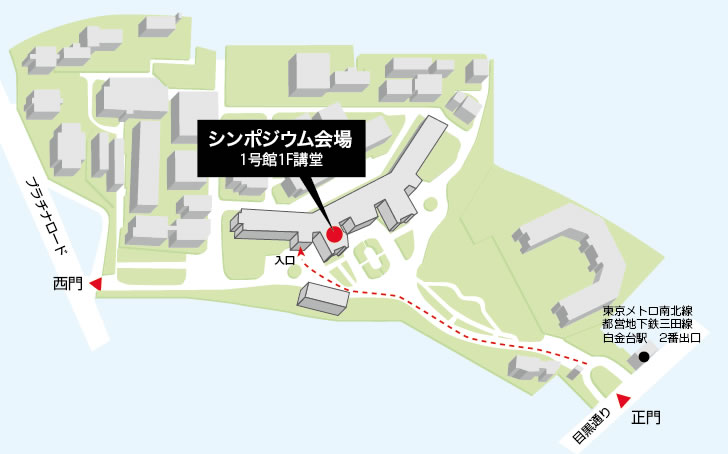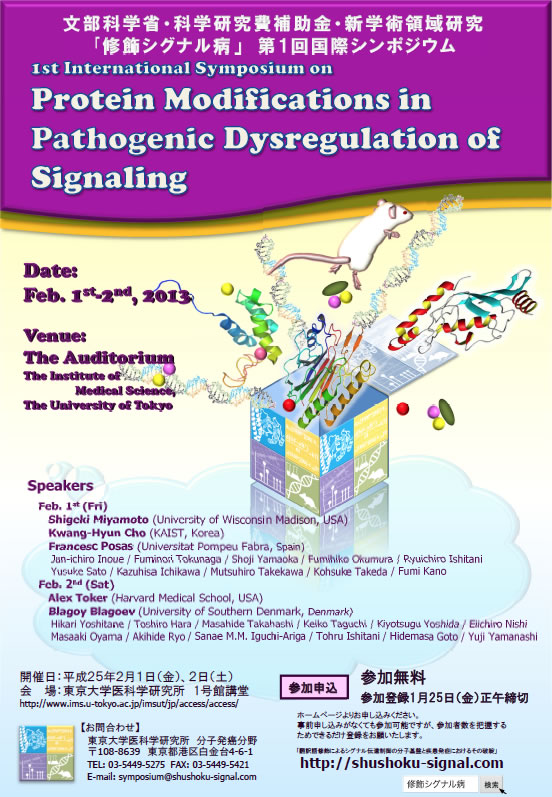
Home > トピックス・イベント > 「修飾シグナル病」第1回国際シンポジウム
文部科学省・科学研究費補助金・新学術領域研究
「修飾シグナル病」第1回国際シンポジウム
開催概要
| 名称 | 文部科学省・科学研究費補助金・新学術領域研究 「修飾シグナル病」第1回国際シンポジウム 1st International Symposium on Protein Modifications in Pathogenic Dysregulation of Signaling |
|---|---|
| 会期 | 平成25年2月1日(金)、2日(土) |
| 会場 | 東京大学医科学研究所1号館1F講堂 〒108-8639 東京都港区白金台 4-6-1[キャンパスマップ・交通案内] |
| 参加費 | 無料 |
| 参加申込み | 参加登録1月25日(金)正午締切 ※下記のフォームからご登録をお願いします。 ※事前申し込みがなくても参加可能ですが、参加者数を把握するためできるだけ登録をお願いたします。 |
| お問い合せ | 東京大学医科学研究所 分子発癌分野 〒108-8639 東京都港区白金台4-6-1 TEL: 03-5449-5275 FAX: 03-5449-5421 E-mail: symposium@shushoku-signal.com |
参加登録
プログラム
February 1st (Fri)
| 9:00-9:05 | Opening remarks Jun-ichiro Inoue |
| Session 1. | Post-translational modifications in the regulation of NF-κB and related signaling I Chairs: Jun-ichiro Inoue & Shoji Yamaoka |
|---|---|
| 9:05-9:30 | Jun-ichiro Inoue “Novel regulations of NF-κB pathway and their implication in cancer development” |
| 9:30-10:20 | Special Lecture 1 Shigeki Miyamoto (University of Wisconsin Madison, USA) “SUMOylation of NEMO in genotoxic NF-κB responses and its implication in cancer resistance” |
| Coffee Break | |
| Session 2. | Post-translational modifications in the regulation of NF-κB and related signaling II Chairs: Fuminori Tokunaga & Yuji Yamanashi |
| 10:40-11:05 | Fuminori Tokunaga “Activation and regulation mechanisms of the linear ubiquitination-mediated NF-κB pathway” |
| 11:05-11:30 | Shoji Yamaoka “Role for A20 in cancer cell survival” |
| 11:30-11:50 | Fumihiko Okumura “Activation of double-stranded RNA-activated protein kinase (PKR) by interferon stimulated gene 15 (ISG15) modification down-regulates cap-dependent translation” |
| Lunch | |
| Session 3. | Analysis of cellular signaling by structural biology and mathematical modeling Chairs: Kazuhisa Ichikawa & Ryuichiro Ishitani |
| 13:00-13:25 | Ryuichiro Ishitani “Specific recognition of linear polyubiquitin by A20 zinc finger 7 is involved in NF-κB regulation and lymphomagenesis” |
| 13:25-13:45 | Yusuke Sato “Structural basis for specific recognition of linear polyubiquitin chains by the NZF domain of HOIL-1L” |
| 13:45-14:10 | Kazuhisa Ichikawa “Computational simulation reveals critical 3D parameters that change oscillation pattern of nuclear NF-κB” |
| 14:10-15:00 | Special Lecture 2 Kwang-Hyun Cho (KAIST, Korea) "Puzzling switches in the signaling network of complex disease" |
| Coffee break | |
| Session 4. | Post-translational modifications in the regulation of MAPK and related signaling Chairs: Mutsuhiro Takekawa & Kohsuke Takeda |
| 15:20-15:45 | Mutsuhiro Takekawa “Regulation of human MAPK pathways and its failure in cancer” |
| 15:45-16:35 | Special Lecture 3 Francesc Posas (Universitat Pompeu Fabra, Spain) "Control of gene expression and cell cycle progression by stress-activated protein kinases" |
| 16:35-16:55 | Kohsuke Takeda “Regulation of cellular stress response by mitochondrial protein phosphatase PGAM5” |
| 16:55-17:15 | Fumi Kano “Disease model cell system for analyzing the perturbation of signal transduction under disease condition” |
February 2nd (Sat)
| Session 5. | Student and young scientist presentation Chairs: Yasunori Saito & Taichiro Tomida |
|---|---|
| 9:00-9:15 | Hikari Yoshitane “JNK is a key regulator of circadian clock oscillator” |
| 9:15-9:30 | Toshiro Hara “Deletion of the Mint3 gene in mice abrogates macrophage functions and increases resistance to cancer metastasis” |
| Session 6. | Regulation of PI3K-AKT signaling during cell fate decisions Chairs: Masahide Takahashi & Jun-ichiro Inoue |
| 9:30-9:55 | Masahide Takahashi “Roles of the Akt substrate Girdin in cell motility” |
| 9:55-10:45 | Special Lecture 4 Alex Toker (Harvard Medical School, USA) “Specificity and Diversity in the PI 3-K and Akt Signaling Pathway in Cancer” |
| Coffee Break | |
| Session 7. | Post-translational modification in cancer development Chairs: Mutsuhiro Takekawa & Fuminori Tokunaga |
| 11:05-11:25 | Keiko Taguchi “Reciprocal activation between Nrf2 and a proliferative signaling in liver” |
| 11:25-11:45 | Kiyotsugu Yoshida “DYRK2 phosphorylation of c-Jun/c-Myc controls tumor progression by monitoring G1/S transition” |
| 11:45-12:05 | Ei ichiro Nishi “Nardilysin promotes cancer development through activation of ectodomain shedding” |
| Lunch | |
| Session 8. | Proteomics approaches to elucidate signal transduction networks Chairs: Masaaki Oyama & Shoji Yamaoka |
| 13:30-13:55 | Masaaki Oyama “Comprehensive description of cancer cell signaling networks by quantitative proteomics and systems biology” |
| 13:55-14:45 | Special Lecture 5 Blagoy Blagoev (University of Southern Denmark, Denmark) “Mapping the dynamics of phosphorylation and ubiquitination in signaling networks by quantitative proteomics” |
| 14:45-15:05 | Akihide Ryo “The peptidyl-p rolyl isomerase Pin1: a novel molecular switch for phosphorylation signaling” |
| Coffee Break | |
| Session 9. | Post-translational modification in cell proliferation and differentiation Chairs: Ryuichiro Ishitani & Atsushi Enomoto |
| 15:25-15:45 | Sanae M.M. Iguchi-Ariga “DJ-1 in cell transformation and neurodegenerative diseases” |
| 15:45-16:05 | Tohru Ishitani “Roles of two Ser/The kinases, NLK and Hipk2, in the regulation of Wnt/β-catenin signaling” |
| 16:05-16:25 | Hidemasa Goto “Novel mitotic signaling crosstalk between PI3K-Akt pathway and Plk1” |
| 16:25-16:45 | Yuji Yamanashi “Dok-7, Lrp4, and MuSK signaling in neuromuscular synaptogenesis” |
| 16:45-16:50 | Closing Remarks Mutsuhiro Takekawa |
キャンパスマップ・交通案内


| A | 東京メトロ南北線・都営地下鉄三田線白金台駅下車。 |
| B | JR山手線目黒駅東口から徒歩15分。 JR山手線目黒駅東口から都バス品93大井競馬場行で、白金台駅前下車。あるいは、都バス黒77千駄ヶ谷行または橋86新橋駅行で、 東大医科研病院西門下車。 |
| C | JR品川駅から都バス品93目黒駅行で、白金台駅前下車。 |
| D | 東京メトロ日比谷線広尾駅そばの都バス広尾橋から黒77または橋86目黒駅行で、 東大医科研病院西門下車。 |












